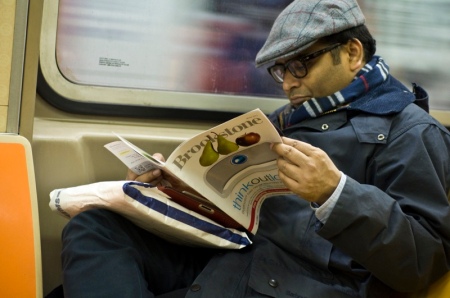 4. READING. In graduate school, one of my writing professors discused the large subset of the publishing industry dedicated to books for “people who don’t read very much.” She characterized romances, thrillers, and the kind of novels sold at drugstores as “books people can fall asleep under.” Though my professor surely meant no malice in describing unchallenging books, her description is not just wrong, it’s potentially harmful.
4. READING. In graduate school, one of my writing professors discused the large subset of the publishing industry dedicated to books for “people who don’t read very much.” She characterized romances, thrillers, and the kind of novels sold at drugstores as “books people can fall asleep under.” Though my professor surely meant no malice in describing unchallenging books, her description is not just wrong, it’s potentially harmful.Of the many myths and caricatures that stick to the working class, none does more harm than the idea that they don’t read. Nothing could be further from the truth; many read committedly. Some read far more than the economic elites who would put them down. But they don’t read what literary scholars say they should read. And they don’t define their lives around which books they consider most worth their time.
English professors claim that “good” books challenge, unsettle, and expand their readers. “Mere” pop literature earns their disdain because it holds no such promise for its audience. Such professors openly mock the authors who sell the most books to the largest audiences, like Tom Clancy, Stephen King, Danielle Steele, and James Patterson. These assembly line authors crank out books to quickly and often to count as “real” literature.
If speed and repetition disqualify authors from the heights of Parnassus, then the converse should also be true, and Johnathan Franzen, who requires ten years to polish and publish just one book, would be the greatest living American author. Some literary critics seem eager to crown him as such. Yet many of my factory peers have no idea who Franzen is, and when told, look unimpressed at the paces he puts himself through.
 Working class readers want to be entertained, uplifted, made to laugh, cry, scream. They do not want to feel confused by language, situations, and manners alien to their experience. Thus many books which scholars tell us we should read, whether acknowledged classics or cutting edge new releases, simply zoom by working class readers. Many blue collar workers can finesse a novel in one night, but get told it doesn’t really count.
Working class readers want to be entertained, uplifted, made to laugh, cry, scream. They do not want to feel confused by language, situations, and manners alien to their experience. Thus many books which scholars tell us we should read, whether acknowledged classics or cutting edge new releases, simply zoom by working class readers. Many blue collar workers can finesse a novel in one night, but get told it doesn’t really count.This essentially colonial attitude toward working class reading habits results in marked anti-intellectualism. If brainy types devalue blue collar reading, then blue collar readers can’t be bothered with intellectualism. During my factory orientation, the HR representative indicated one suite of offices to which we had no admittance. A woman behind me sneered: “That’s where the people with college degrees work.”
I chose not to reply that I, too, have a college degree. It’s just as well I didn’t, since I now know about a quarter of my factory colleagues have at least one degree, and some, like me, have graduate degrees. Yet this disdain for intellectuals is not about me, or any individual, as people. Rather, many workers see intellectuals, rightly or wrongly, as the ones holding back their economic potential.
This results in reading as a compartmentalized activity for many in the working class. They read at home, and they work at work. Looking around the breakroom, you would not see so much as a magazine or newspaper. Breaktime is for talking, which is where real information transactions occur. I’ve seen peers completing crossword puzzles in their cars, but they leave the paper behind when they enter the factory.
Blue collar orality is famous among those who study such things. When trying new tasks, somebody like me might naturally reach for a book; but workers prefer to teach skills through oral explanation and mimicry. This apprenticeship arrangement, which may last minutes for simple tasks, or years for a body of knowledge, fills the role scholars and white collar professionals associate with school and book learning.
 That said, nobody bothers me about bringing books to read on my own breaktime. Recently, two peers saw me reading the prerelease edition of a mystery due out later this month. Both became very excited, asking me questions and talking about books they’ve enjoyed recently. In other words, though they wouldn’t read on the job themselves, they were able to have a group bonding moment around my reading.
That said, nobody bothers me about bringing books to read on my own breaktime. Recently, two peers saw me reading the prerelease edition of a mystery due out later this month. Both became very excited, asking me questions and talking about books they’ve enjoyed recently. In other words, though they wouldn’t read on the job themselves, they were able to have a group bonding moment around my reading.One last note on working class reading. I have never seen my factory peers with a Kindle or other reading device. Though I’ve seen at least two workers with tablet computers, they use these to store and play music or movies. My peers cannot be bothered to pay good money for a gee-whiz gadget to do what the public library lets them do for free.
PART THREE: RELIGIOSITY AND EGALITARIANISM
No comments:
Post a Comment